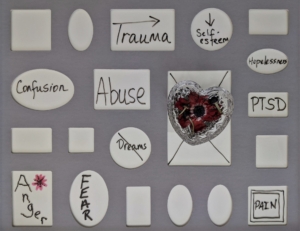Thinking the best of your loved ones can allow you to overlook some of their rough edges. This is helpful because any given day can have many irritations that cause distress if they are all taken to heart. Distinguishing between mild irritations, and issues that are more significant and that require you to address them is an important skill.
Patterns of abuse in a family undermine your well-being as well as the quality of the relationship. Identifying these issues and patterns can help you put a stop to them, but this will often require some difficult conversations and intentional work to improve things.
Defining Emotional Abuse
The word ‘abuse’ can feel quite heavy, especially when it’s being used to describe certain actions, attitudes, words, or patterns of behavior of your loved ones toward you. If you pause and think about it, ‘abuse’ conveys the notion of using something poorly or in a way that it’s not supposed to be used. Relationships and our connections to one another are meant to be places of safety and nurture, as opposed to hurt and discouragement.
 Emotional abuse is when a person is subjected to a pattern of behaviors that wear down their mental health and undermine their self-esteem. It often involves attempts to control, silence, discredit, frighten, or isolate another person by using their emotions to blame, shame, humiliate, criticize, or manipulate them. One of the main results of emotional abuse is that it erodes a person’s self-esteem, and it undermines their confidence in themselves.
Emotional abuse is when a person is subjected to a pattern of behaviors that wear down their mental health and undermine their self-esteem. It often involves attempts to control, silence, discredit, frighten, or isolate another person by using their emotions to blame, shame, humiliate, criticize, or manipulate them. One of the main results of emotional abuse is that it erodes a person’s self-esteem, and it undermines their confidence in themselves.
Emotional abuse can happen in any kind of relationship, and that includes the parent-child relationship. Parents are in a position of authority over their children, and with that authority comes the responsibility to nurture them and not exasperate them (Ephesians 6:1-4; Proverbs 4). Unfortunately, parents sometimes relate to their children in ways that can only be described as emotionally abusive, and that harm their children.
Signs Of Emotional Abuse
One of the unfortunate results of emotional abuse is that it can make you feel uncertain about your own judgment. You might feel unsure of yourself and whether what you’re going through is well and truly normal, or deeply problematic. You might go so far as to begin convincing yourself that perhaps you’re overreacting, partly because you want to believe the best of your parents.
Some of the signs of emotional abuse are detailed below. Because emotional abuse can often be subtle, it’s also important to pay close attention to how you feel after interactions with your parents.
If your interactions with your parents leave you feeling anxious, depressed, confused, frustrated, hurt, misunderstood, or worthless, that indicates a likelihood that the relationship is emotionally abusive.
The signs of emotional abuse to look out for include the following:
Being demeaned or insulted
Shame is one of the ways a person can be emotionally abused. If your parents make jokes about you or call you names, whether in private or in public, and these jokes or comments are at your expense and make you feel lesser than or worthless, that could point to an emotionally abusive relationship.
Unrealistic expectations
Parents often want what’s best for their children, but they can also have unrealistic expectations and make unreasonable demands on you. These include being dissatisfied no matter how hard you work at something, expecting your opinions to coincide with theirs, or wanting you to perform tasks to their standard at the risk of facing their criticism.
Using emotional blackmail
 Attempts to use your feelings against you can amount to emotional abuse. If your parents leverage your values, fears, or triggers to get you to do what they want in a given situation, that form of control is a type of emotional abuse. It’s also a problem when a parent tries to punish you by withholding love and affection from you, or they meet you with silence instead of articulating what’s happening.
Attempts to use your feelings against you can amount to emotional abuse. If your parents leverage your values, fears, or triggers to get you to do what they want in a given situation, that form of control is a type of emotional abuse. It’s also a problem when a parent tries to punish you by withholding love and affection from you, or they meet you with silence instead of articulating what’s happening.
Controlling
Parents ought to invest in their children’s well-being, including helping their children to make good choices. However, a parent can cross the line by trying to control who they spend time with, excessively monitoring their devices, or using jealousy as a way to keep them from forming relationships with other people.
Invalidating or dismissing you
When you’re hurt by something they have said or done, your parents might respond by accusing you of being oversensitive or emotional. If they respond to your desire for space or resources to meet your needs by calling you ‘selfish’ or ‘needy’, that too may be a sign of an emotionally abusive relationship.
Making threats
One of the roles that a parent has is to provide discipline for their children. That discipline honors the child, their humanity, and their personality. It isn’t intended to demean or humiliate the child or to shame or scare them into the right behavior. Gospel-shaped discipline aims to graciously transform the heart, and it’s inconsistent with threatening a child with violence or deprivation to ensure compliance.
When a parent also blames their child for their abusive or unhealthy behaviors, that can also be a form of emotional abuse.
Role reversal
There is a time and a place for a child to take care of their parent. However, if a parent is irresponsible or tries to guilt their child into taking care of them or their needs, that too can be a form of emotional abuse. If a child is forced by circumstances to take on the parental role of nurture when their parent ought to be the one occupying that role, that’s also a sign of emotional abuse.
Emotional outbursts
Everyone has emotions, and these emotions are often powerful. If a parent has drastic mood changes, or sudden and powerful emotional outbursts that make their child feel unsafe or that make them walk on eggshells for fear of triggering an unpredictable parent, that too can be a form of emotional abuse.
 Emotional abuse can undermine a person’s sense of self, their confidence in themselves, and their judgment, and it can eventually lead to a person internalizing the criticisms leveled at them. You can wind up feeling so diminished that you withdraw from your relationships. Not only that, but emotional abuse can have physical and mental health effects too, such as insomnia, stomach ulcers, anxiety, depression, and eating disorders.
Emotional abuse can undermine a person’s sense of self, their confidence in themselves, and their judgment, and it can eventually lead to a person internalizing the criticisms leveled at them. You can wind up feeling so diminished that you withdraw from your relationships. Not only that, but emotional abuse can have physical and mental health effects too, such as insomnia, stomach ulcers, anxiety, depression, and eating disorders.
Some of the behaviors above may seem familiar to you. It may be tempting to dismiss them rather than face the conclusion that the relationship with your parents is problematic. You aren’t alone in facing such challenges, and help is available to deal with these concerns.
Getting Help to Deal With Emotionally Abusive Parents
The first step in dealing with emotionally abusive parents is to name what you’re going through. Being honest with yourself about what’s happening can at least help you come to grips with what you’re experiencing, and how it may be affecting you. Calling certain behaviors that your parents engage in “abusive” is a huge step, but it’s a necessary one along the path to wholeness and healing.
When it comes to addressing issues with one’s parents, there are a broad variety of dynamics, including navigating how your family and culture approach correcting your elders. There may be a need to speak to a loved one such as a respected family member, or to talk to a friend. Emotional abuse can have you doubting yourself, so being able to talk to someone and have your experiences validated can make a huge difference.
 Another step you can take includes prioritizing self-care. This could mean taking the time to meet your own needs, affirming what is true and good about yourself, no longer blaming yourself for how you’ve been treated, and beginning to feel okay about not pleasing your parents in everything. You also need a support network, and this could include loved ones, or going for either group or individual counseling.
Another step you can take includes prioritizing self-care. This could mean taking the time to meet your own needs, affirming what is true and good about yourself, no longer blaming yourself for how you’ve been treated, and beginning to feel okay about not pleasing your parents in everything. You also need a support network, and this could include loved ones, or going for either group or individual counseling.
Counseling can create a safe space for you to talk about your experiences and develop insight into the dynamics of the relationship with your parents. Through counseling, you can also develop strategies for how to deal with the abusive behavior of your parents.
The relationship can be different, but it requires work and the willingness to change things. Through family counseling, old wounds can be addressed and new behaviors initiated. If you are ready to talk to a counselor about healing the wounds of emotionally abusive parents, contact our office today.
“Trauma”, Courtesy of Susan Wilkinson, Unsplash.com, CC0 License; “You Matter”, Courtesy of Eneida Hoti, Unsplash.com, CC0 License; “I give you my heart”, Courtesy of Kelly Sikkema, Unsplash.com, CC0 License; “Hope”, Courtesy of Ron Smith, Unsplash.com, CC0 License









